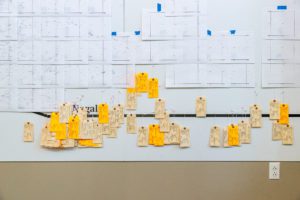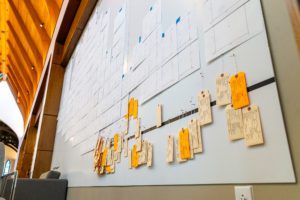When you enter Lutnick Library, you are now greeted by a giant map. Currently it has around 50 beige and orange tags tacked up on it, but by the end of the semester, it should be filled with hundreds more. This map, part of the Hostile Terrain 94 exhibit, depicts the Arizona-Mexico border, and the tags represent a life lost trying to cross it. In 2020, over 120 colleges and universities spanning six continents simultaneously worked on tagging the same map in the interactive exhibit, but Haverford delayed their exhibit until this semester since the pandemic halted in-person collaboration.
Hostile Terrain 94 was created by the Undocumented Migration Project, a nonprofit that aims to raise awareness of the violence due to immigration. It documents the impact of the United States Border Patrol’s “Prevention Through Deterrence” policy (PTD), which was enacted in 1994 and is still in use today. That policy was created in response to a surge in immigrants crossing the US-Mexico border, and it increased immigration security in urban areas to shift undocumented migration to the difficult crossing in Sonoran Desert as a deterrent to border crossing.
This exhibit was originally brought to campus by Brie Gettleson, a former social sciences librarian. She has a background in Latin American studies and knew the coordinator of the project, and thought it would be an impactful exhibit. Seymon Khokhlov, research and instruction librarian, finds the exhibit is a way to “memorialize people who perished trying to cross the Sonoran desert.”
The library hosted its first related workshop on Sept. 27, inviting the Haverford community to fill out tags with information about the people whose body and remains were found along the Arizona-Mexico border.
“[It was] kind of horrifying to see these atrocities, but glad this project is bringing to light these issues and helping them be remembered,” said Caroline Donado ’23, who attended that event. “l’m really happy to contribute to such an amazing project.”
Throughout the semester, five Haverford classes will partner with the libraries to contribute to this tag-making: “Senior Capstone in Peace, Justice, and Human Rights;” “Trauma, Historical Historical Memory, and Embodiment;” “Basic Intermediate Spanish,” and “Applied Ethics of Peace, Justice, and Human Rights.”
The Haverford Libraries will host additional workshops on Nov. 3 at noon and Nov. 29 at 4:30 p.m. Perla Torres, the Family Network Director at the Colibrí Center for Human Rights, will be in the library to discuss the impacts of this project and of the PTD policy at those events.




